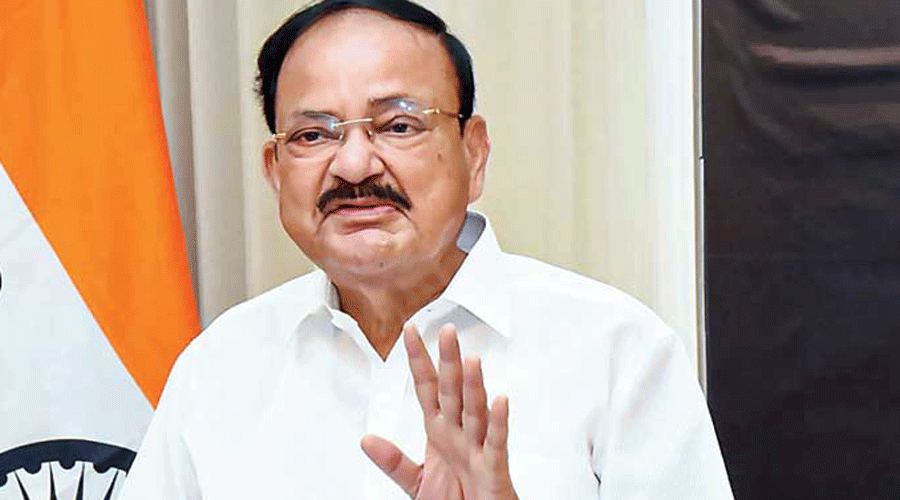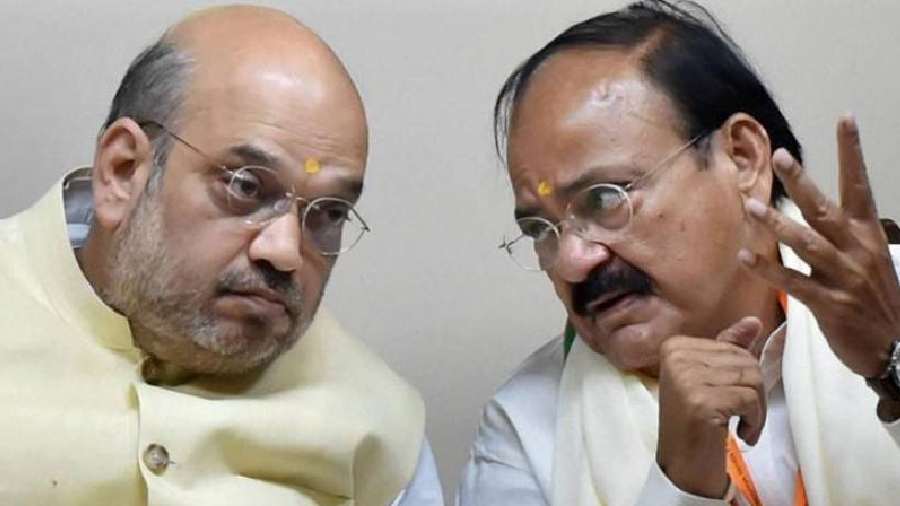Rajya Sabha chairman M. Venkaiah Naidu has just a fortnight to resuscitate on his watch Rule 267, which the Opposition says has not put in an appearance even once in the Upper House in the past five years.
Rule 267 provides for the suspension of listed business to discuss a subject raised by one or more members.
On Monday, the Opposition pointed out that it has been well over five years that an issue had been allowed to be taken up under the clause. The clock is ticking — Naidu’s tenure as the Vice-President of India ends on August 10.
A chance to prove that Rule 267 is not extinct did come up on Monday. Congress leader Mallikarjun Kharge, the Shiv Sena’s Priyanka Chaturvedi and the Trinamul Congress’s Derek O’Brien moved a motion under the rule to discuss the rise in the prices of essential commodities and the increase in GST on pre-packed grains.
But deputy chairman Harivansh said chairman Naidu would not allow a discussion under Rule 267. Harivansh wanted the members to discuss a calling attention motion on “post-Covid complications” instead. The Opposition members protested by holding up placards and shouting slogans.
The leader of the Rajya Sabha, Piyush Goyal, said the government was ready for a discussion on any issue, including price rise, and accused the Opposition of running away from it.
Kharge demanded a discussion under Rule 267. O’Brien said: “Since July 2017 to now — 2022 — in the last five years not a single time a notice for discussion under Rule 267 has been taken up.”
Any member can give a notice to the Chair for a discussion on any subject under Rule 267. Two such notices were allowed in 2016 and one in 2015, when Hamid Ansari was the chairperson.
According to Parliament records, the last time the Rajya Sabha witnessed a discussion under Rule 267 was on November 16, 2016. The issue was demonetisation.
Earlier on April 23, 2015, the Upper House had taken up for discussion the agrarian crisis in various parts of the country under Rule 267. On August 10, 2016, the House discussed under the rule the situation in Kashmir.
Naidu — chairperson since August 11, 2017 — has rejected several hundred notices under Rule 267, on subjects such as the Rafale deal, the GST implementation, price rise, the Pegasus snooping allegations, hate speech and attacks on Dalits and minorities.
During the monsoon session last August, Trinamul member Sukhendu Sekhar Ray — one of more than a dozen members to have given notices on the Pegasus allegations under Rule 267 — had brought up the five-year gap.
Naidu had replied: “Right, Sukhendu Sekharji, you have made your point. We have to discuss it also whenever we meet in GPC (general purposes committee) or whatever it is.”
“I am receiving 10 to 15 notices under Rule 267 every day on different issues,” Naidu had acknowledged.
On Monday, amid Opposition demands for a discussion under Rule 267, the Rajya Sabha took up the Weapons of Mass Destruction and their Delivery Systems (Prohibition of Unlawful Activities) Amendment Bill. The House was adjourned twice because of disruptions.












